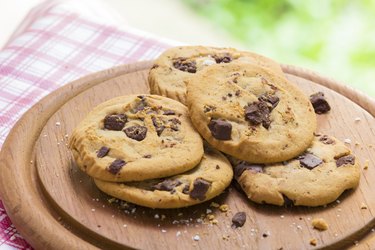
If you're like most Americans, you consume 22 teaspoons of added sugars per day. Corn syrup, whether liquid or solid and with or without fructose, is an added sugar that may contribute to obesity and heart disease. Decrease your added sugar intake to 6 teaspoons if you're female and 9 teaspoons if you're male, advises the American Heart Association.
How Corn Syrup Solids and HFCS Are Made
Video of the Day
Corn syrup is 100 percent glucose, the smallest form of sugar. To make corn syrup solids, food manufacturers dehydrate the syrup until it's only 10 percent water. They use the dried product in powdered coffee creamers, drink mixes and baby formula. Start with corn syrup again, but this time leave it in liquid form and add fructose -- another naturally-occurring sugar -- and you have high fructose corn syrup, or HFCS. Food manufacturers use it to sweeten processed foods and beverages, from soda and cookies to ketchup.
Video of the Day
How These Sweeteners Affect Your Health
Your body processes glucose a little differently than fructose, but the two sugars have the same effect on certain markers of sugar-associated disease, reports a study published in 2014 in "Current Opinion in Lipidology." You metabolize HFCS the same as other glucose-fructose sweeteners, such as table sugar, fruit juice and honey, according to a 2008 study in the "American Journal of Clinical Nutrition." HCFS is no more responsible for obesity than other refined sugars, adds the author.
- American Heart Association: Added Sugars
- INRFOOD: Corn Syrup Solids
- INRFOOD: High Fructose Corn Syrup
- Current Opinion in Lipidology: Fructose vs. Glucose and Metabolism: Do the Metabolic Differences Matter?
- American Journal of Clinical Nutrition: Straight Talk About High-Fructose Corn Syrup: What It Is and What It Ain’t